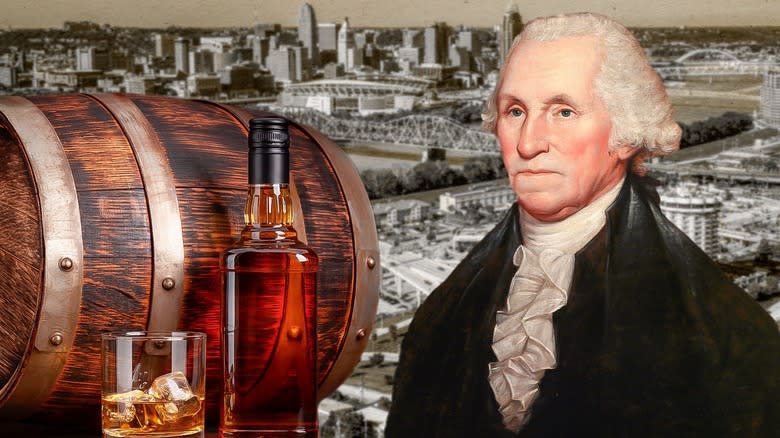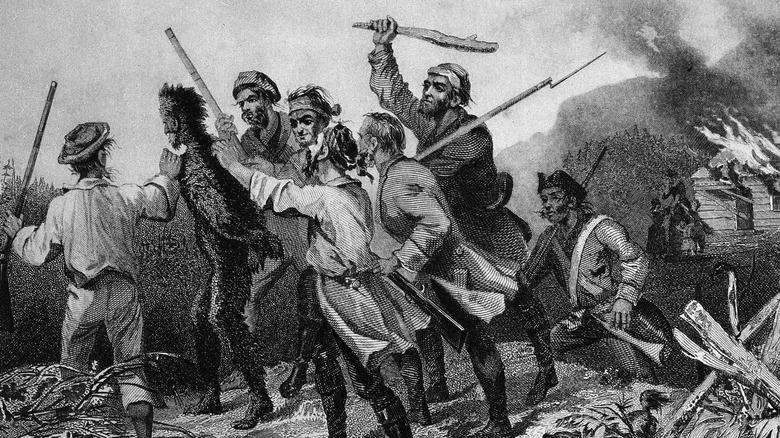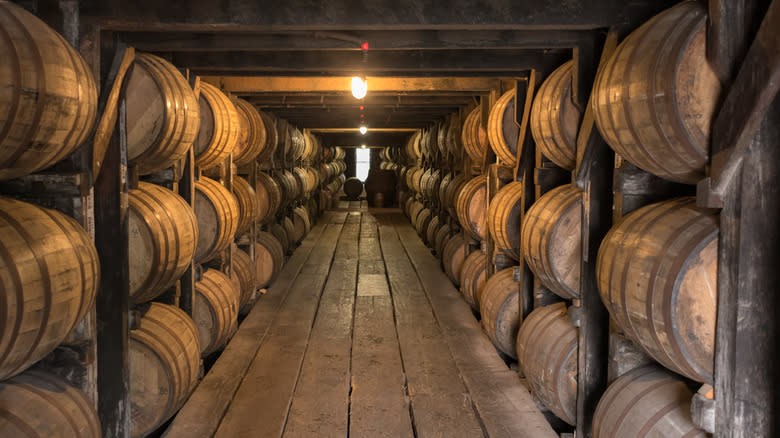How The Whiskey Rebellion Allowed Kentucky's Bourbon Industry To Thrive

When we talk of bourbon, most people will immediately have two thoughts: Rich, smoky flavors, plus the deep-rooted ties to the state of Kentucky. Yet, beneath its delightful taste lies a fascinating tale of resilience. This iconic spirit's journey is intertwined with significant moments in the history of the U.S., most notably the Whiskey Rebellion. This early uprising in the young United States not only played a pivotal role in the development of the republic, but it also had a great impact on the evolution of American whiskey, particularly bourbon.
The Whiskey Rebellion, a relatively small-scale conflict over whiskey taxes, occurred from 1791 to 1794. Despite its limited size, the conflict's resolution and aftermath led to several major turning points. One of them was the integration of American whiskeys into the country's cultural heritage and the pride and identity it brought to distillers in the Appalachian and frontier regions. Without it, American spirits wouldn't enjoy the same prominence and influence they do today!
Read more: The 25 Best Bourbon Brands, Ranked
The Whiskey Rebellion Set The Stage For Bourbon To Become An All-American Treasure

The United States had recently won its hard-fought battle for independence just over a decade prior, but it came at a high cost in terms of both lives and money. Before the U.S. Constitution was ratified, the central government, known as the Continental Congress, couldn't impose taxes to pay off its substantial debt. This debt totaled a whopping $79 million, including war expenses and state government costs.
To tackle this debt, the newly-formed government introduced the first-ever tax on a product made within the United States, focusing on "spirits distilled within the United States." This became the Excise Whiskey Tax of 1791. However, fresh out of a war sparked on the pretext of heavy taxes, many people, especially frontier farmers in western Pennsylvania, who relied on small-scale whiskey production for income, were naturally unhappy. Their dissatisfaction led to violent protests that were initially contained in Western Pennsylvania but then spread to other states around the Appalachian, such as Maryland, Virginia, the Carolinas, and Georgia.
Recognizing the threat to federal authority, President George Washington took action in 1794 by leading troops to suppress the rebellion. While this action was successful, it had an unintended consequence. Many of these farmers fled to Kentucky, where whiskey tax enforcement was lenient. By 1802, the tax was repealed, but the migration had already set Kentucky on the path to becoming the capital of American whiskey that it's now known as today.
The Bourbon Boom In Kentucky

Following the Whiskey Rebellion and the exodus of distillers from the northern states to Kentucky, the whiskey-making business really took off here. Kentucky offered not only lower taxes on distilled spirits but also unique geographical advantages, such as mineral-rich water and ideal climatic conditions for aging whiskey. These factors solidified Kentucky's position as the bourbon capital.
As distillers made their way to Kentucky, they adapted their whiskey recipes, switching from rye to corn. Kentucky's fertile land made growing corn easy, and distillers were more than happy to use corn in their mash bills instead. This shift led to the creation of a unique kind of corn-based whiskey in the state, later known as bourbon.
But post-Rebellion and the scrapping of the Whiskey Tax, the government still had to find a way to make money. So, they instead slapped hefty taxes on rum and cane molasses. Back then, rum was the booze of choice for most, but once it got too expensive, people naturally turned to Kentucky whiskey due to it being a lot more affordable. The state took full advantage of the increase in demand and rose to the occasion, leveraging its convenient waterways to ship barrels of bourbon to major cities. These shipments left a lasting legacy, so much so that even though bourbon doesn't have to come from Kentucky, it's forever linked to the state and now become the de facto heart of America's bourbon industry!
Read the original article on Tasting Table.


